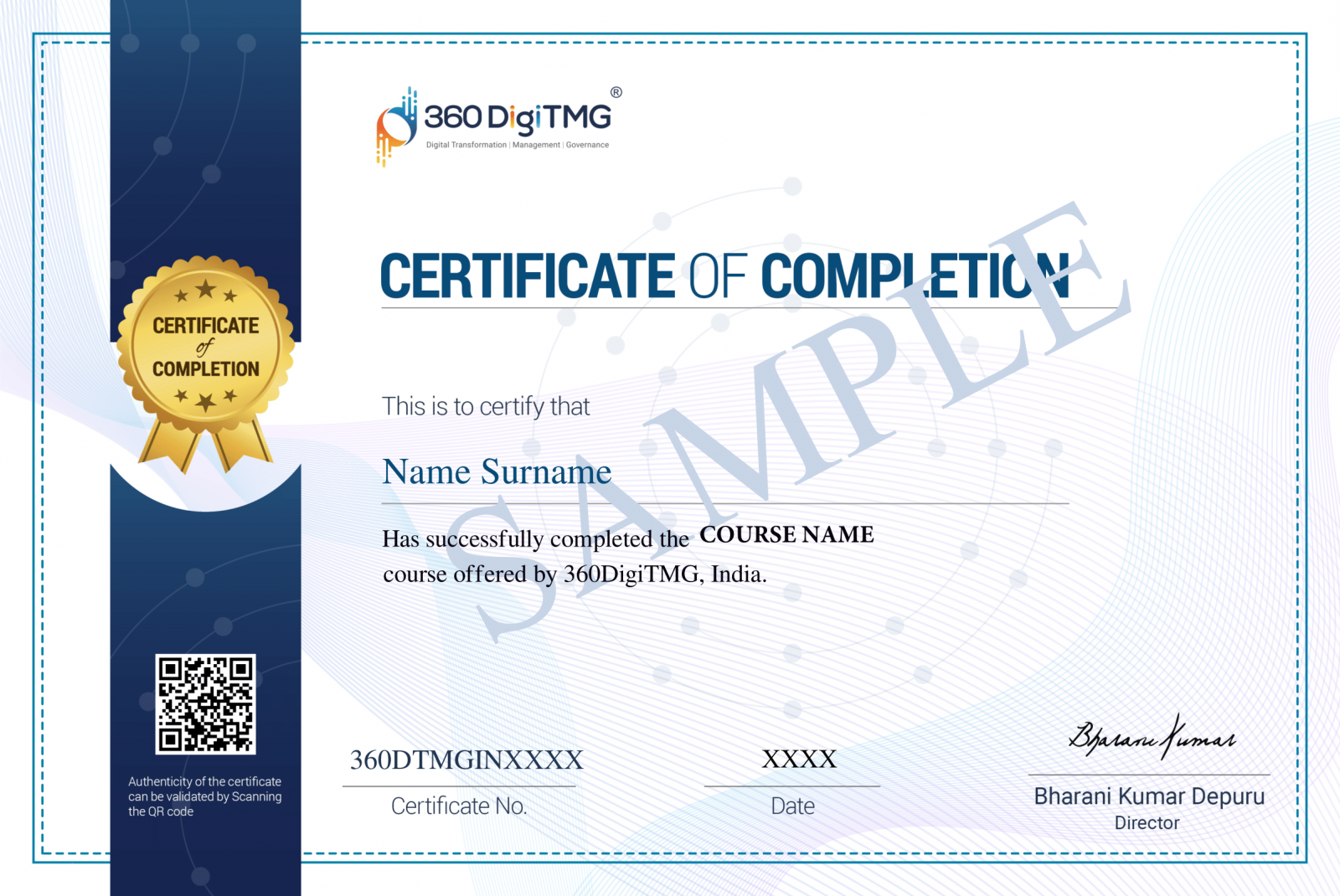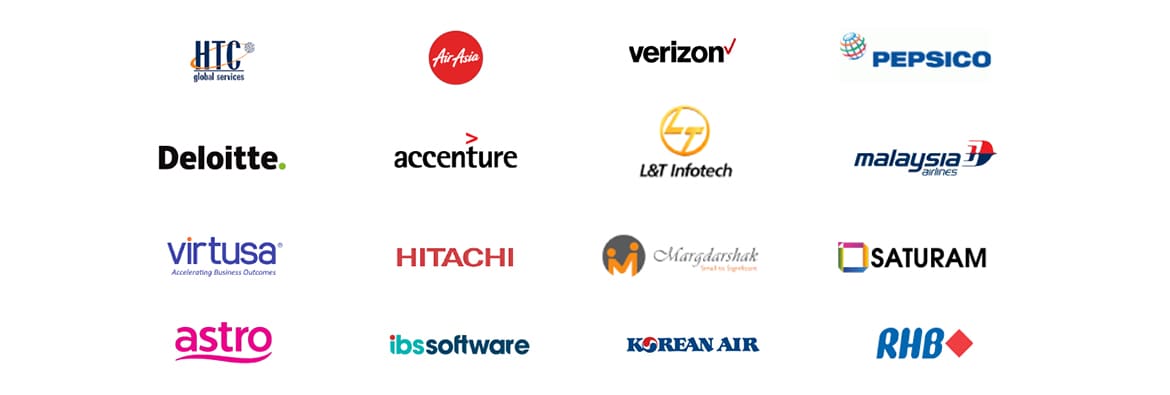Generative AI and Prompt Engineering Certification Course
- Get Trained by Trainers from ISB, IIT & IIM
- 200+ Hours of Intensive Online Training
- 64 Hours of Python, SQL, EDA Live or Videos
- 2 to 4 Live Projects
- Job Placement Assistance
2834 Learners
Academic Partners & International Accreditations
The Generative AI and Prompt Engineering course is designed to guide the participants through the foundational concepts of the Neural network models' journey to solve complex problems. The Evolution of Large Language Models has provided ground-breaking solutions for businesses. You will learn to leverage the existing solutions by getting a deep understanding of the current LLM architectures, variants, and challenges. This course exposes the practical applications of Generative AI solutions in various domains like Healthcare, Manufacturing, Marketing, etc.
Course Fee
Generative AI & Prompt Engineering Training Programme Overview
"Prompt engineering" may appear to be a challenging undertaking. However, in practice, it's really easy to understand and doesn't even need a high level of technical expertise. Understanding these principles will enable you to take use of the amazing potential of Generative AI right now. Tools like ChatGPT that use Generative AI have countless applications. Professionals are using this technology to automate laborious tasks, generate fresh ideas, do research instantly, and much more. It also helps to simplify the development of content. Gaining an understanding of rapid engineering is the first step in enabling all of these possibilities.
What is Generative AI and Prompt Engineering?
Systems using generative artificial intelligence (AI) are made to produce certain results according to how well prompts are given. Generative AI models that use prompt engineering are better able to understand and react to a broad variety of questions, ranging from the very basic to the very complex. Fundamentally, excellent impulses lead to good outcomes. Prompt engineering and Generative AI are two increasingly valuable technologies that companies may use. Here's a handbook to help you become an expert in these methods and maintain your competitive edge. Recognise the concets of Generative AI: A branch of artificial intelligence called "Generative AI" deals with creating original and new text/video/audio data via the use of algorithms.
Course Objectives:
- To comprehend complex Generative AI ideas for text production
- To investigate deep learning methods associated with rapid engineering
- To examine moral issues in the creation of content using AI
- To comprehend the scalability and interpretability of AI language models
- To understand quality control and use cases in timely engineering
- To recognise and foresee emerging patterns in data (text/video/audio) production powered by AI
Generative AI & Prompt Engineering Training Learning Outcomes
Determine which issues can be solved with artificial intelligence approaches. Utilise a few fundamental AI techniques and assess if more sophisticated ones are applicable. Take part in the creation of intelligent systems that absorb knowledge from their experiences. The main goals of Generative AI include the creation of fresh, unique material, designs, chat answers, synthetic data, and even deepfakes. It is especially useful for addressing new problems and in creative domains since it can produce a wide variety of new outputs on its own. Content may be tailored to each user's preferences thanks to Generative artificial intelligence. AI algorithms are able to create personalised learning materials that are tailored to your individual learning style through the analysis of learning patterns and preferences. This enables improved comprehension and engagement.
Block Your Time

200+ hours
Live Sessions

20 hours
Python Programming Videos

60 hours
Deep Learning Videos
Who Should Sign Up?
- Data Scientists
- Data and Analytics Manager
- Business Analysts
- Data Engineers
- DevOps Engineers
- IT/Software Engineers
- Machine Learning Architects
- Model Risk Managers/Auditors
Methodology
- Lecture with a blend of theoretical & practical exposure
- Discussions & final exam to attain the certificate
- Quizzes and group activities
- Internship opportunity for eligible candidates
Generative AI & Prompt Engineering Certification Modules
Since the tech sector has embraced Generative AI and AI systems, the term "prompt engineer" has lately surfaced. But while AI prompt engineering is still in its infancy, there isn't yet a particular accreditation for it. Certifications are issued by associations for professionals in the field or by educational establishments; however, real-world experience with Generative AI applications and machine learning models is sometimes more valuable than certifications for those who are interested.
- Introduction to Vector Databases and Their Role in AI
- Deep Dive into RDBMS (SQL), NoSQL, and Vector Databases. Understand the Pros and Cons of these solutions.
- Understanding the vector databases' role in the field of product development with Generative AI.
- Improving the responsiveness and contextual understanding of AI-driven chatbots and virtual assistants with Vector Embeddings.
- Hands-on: ElasticSearch - Installation and Configuration
- Hands-on: FAISS - Setup
- Hands-on: Milvus - Installation and Configuration
- Introduction to Prompt Engineering
- Foundations of Prompting.
- Use case: Practical exercises and demonstrations on creating prompts for various tasks using ChatGPT.
- Information retrieval
- Creative writing
- Explore different types of Prompts, Prompting Strategies, and Principles of effective prompt designing
- Prompting Techniques:
- Zero-shot and One-shot Prompting
- Information Retrieval and Creative Writing
- Advanced Prompt Structuring
- Prompt Reframing and Combination
- Interactive Storytelling and Language Translation
- Sequential Prompting and Self-Consistency
- Analogical and Meta-Ask Prompting
- ReAct and OPRO
- Chain Of Thought
- Iterative Prompting
- Best practices for maintaining user privacy and security measures to prevent misuse of AI technology.
- Exploring Prompting Tools: Introduction to libraries, models, and frameworks available for prompt engineering.
- AI vs XAI vs GenAI
- Intro to Generative AI for Text Data
- Deriving insights by performing sentiment analysis with Text Mining and NLP
- Text Mining & NLP
- NLU vs NLG
- Data Preprocessing
- Tokenization
- Bag of Words
- DTM/TDM and TFIDF
- Word Cloud – Uni-Gram, Bi-Gram
- Text Summarization
- Language Models
- History of NN and RNN
- Challenges with Traditional RNNs
- LSTM
- GRU
- GANs
- Autoencoders
- Diffusion Models
- Text Mining & NLP
- Learn the Transformer architectures implemented for machine translation and automated summarization.
- Transformers
- Encoders
- Decoders
- Transformer Architecture
- Transformers
- Learn about the groundbreaking uses of BERT and GPT in automated content creation.
- Seq2Seq & Attention Mechanism
- BERT & GPT Models
- Implementing Chatbots to enhance interaction quality and operational efficiency for effective customer engagement across industries.
- Chatbot History
- Hands-on – Traditional Chatbot development
- Learn how LLMs like GPT and BERT are revolutionizing with improved accuracy of information retrieval across digital libraries.
- LLMs 101
- Semantic Search
- Types of Large Language Models
- Datasets for LLMs
- Model Evaluation & Benchmarks
- Fine Tuning Techniques
- Hyper Parameters of LLMs
- Regularization Techniques of LLMs
- Customization – Embeddings and Models
- Challenges
- Hallucination Detection Techniques
- Foundation Models
- Small Language Models
- Frameworks for Building LLM Applications
- RAG (Retrieval Augmented Generation)
- Learn to build specialized models in healthcare, and the financial sector as part of Domain-Specific LLMs.
- Exploring the World of AI-generated imagery with Dall-E 3 and Imagen.
- Learn the creation of realistic video sequences from textual inputs, significantly reducing production time and costs.
- Leveraging tools like ViT and SDXL Turbo in Automated Image Analysis.
- Explore the use of advanced AI models like BLIP-2 and Flamingo in enhancing user experience.
- Discover how models are used in various business platforms for image-based applications to enhance customer experience and engagement
- Learn Generative AI tools like Soundful and Lyria to transform music production.
- Enhancing Multimedia Experiences with the Video-Audio-Text Transformer (VATT).
- Improving audio quality and enabling innovative sound manipulation techniques with models like Distil-Whisper and SALMONN.
- Enhancing user engagement through tailored listening experiences.
- Platforms that respond to both text and image inputs.
- Integrate visual and textual information with like LLaVA and GPT-4V
- Transforming digital marketing, storytelling, and educational content generation with models like Fuyu and Fuyu-8B that combine text, image, and video.
- Learn about the importance of diverse datasets like PMD, COCO, and Flickr30K in training AI.
- Benchmarks: VQAv2 and TextVQA - to evaluate the effectiveness of multimodal AI models.
- Visual search and image-based analysis with innovative models BriVL and Qwen-VL.
- Creating enriched multimedia experiences in virtual reality, video editing, and automated captioning with SALMONN.
- Generative AI on AWS:
- Develop Generative AI models with AWS services: Amazon Bedrock and SageMaker.
- Generating code snippets and entire functions with Amazon CodeWhisperer.
- Using high-performance computing services AWS Trainium and Inferentia to Optimize the training and deployment of AI models
- Broad spectrum of Generative AI applications on Cloud platforms – Azure
- Azure OpenAI Service
- Azure AI studio
- Microsoft Copilot
- Broad spectrum of Generative AI applications on Cloud platforms – Azure
- Gemini
- Vertex AI
- Duet AI in GCP
Capstone:
Use case1: Developing a customer service Chatbot using LLMs tailored for local needs.
Use case2: AI-assisted document translation and topic modelling to identify key subjects and trends.
Use Case3: Chatbot for web-scraping data
Use Case4: Pharmaceutical Classification System using Large Language Models
Use Case5: PharmaBot: A Natural Response Chatbot for Drug Classification and Information (LLM)
Tools Covered






























Trends in Generative AI & Prompt Engineering
Enterprise apps and services are starting to use Generative AI in prompt engineering, which has a lot of promise. But there are drawbacks as well, such applications that lag and possible AI hallucinations (like the Australian mayor's lawsuit against OpenAI and Google's Bard misstating planetary images). Chatbot misinformation might result in unsafe repairs and brand harm. Businesses that are successful will create countermeasures to reduce false information and figure out how Generative AI may benefit their consumers and bottom line.
- Creation based on prompts
- Business use cases are unlocked via APIs
- Rethink organisational procedures
- Better health applications
- Improved artificial intelligence data
- More proficient scenario development
- Hybrid vehicles increase dependability
- Customised generative programmes
- Apps that are domain-specific
- Interfaces using natural language
How we prepare you
-
Additional Assignments of over 60+ hours

-
Live Free Webinars

-
Resume and LinkedIn Review Sessions

-
Lifetime LMS Access

-
24/7 Support

-
Job Placements in Generative AI Fields

-
Complimentary Courses

-
Unlimited Mock Interview and Quiz Session

-
Hands-on Experience in Live Projects

-
Offline Hiring Events

Call us Today!

Certificate
Acquire a certification to demonstrate your dedication to the field of generative AI. Utilize it as a tool to distinguish yourself in the job market, gain recognition within your workplace, and boost confidence. The Generative AI Certificate serves as your key to an accelerated career path in this cutting-edge field..
Recommended Programmes
Certificate Course on Data Science

 2064 Learners
2064 Learners
Big Data using Hadoop & Spark Course Training

 3021 Learners
3021 Learners
Artificial Intelligence (AI) & Deep Learning Course

 2915 Learners
2915 Learners
Alumni Speak

"The training was organised properly, and our instructor was extremely conceptually sound. I enjoyed the interview preparation, and 360DigiTMG is to credit for my successful placement.”
Pavan Satya
Senior Software Engineer

"Although data sciences is a complex field, the course made it seem quite straightforward to me. This course's readings and tests were fantastic. This teacher was really beneficial. This university offers a wealth of information."
Chetan Reddy
Data Scientist

"The course's material and infrastructure are reliable. The majority of the time, they keep an eye on us. They actually assisted me in getting a job. I appreciated their help with placement. Excellent institution.”
Santosh Kumar
Business Intelligence Analyst

"Numerous advantages of the course. Thank you especially to my mentors. It feels wonderful to finally get to work.”
Kadar Nagole
Data Scientist

"Excellent team and a good atmosphere. They truly did lead the way for me right away. My mentors are wonderful. The training materials are top-notch.”
Gowtham R
Data Engineer

"The instructors improved the sessions' interactivity and communicated well. The course has been fantastic.”
Wan Muhamad Taufik
Associate Data Scientist

"The instructors went above and beyond to allay our fears. They assigned us an enormous amount of work, including one very difficult live project. great location for studying.”
Venu Panjarla
AVP Technology
Our Alumni Work At

And more...
FAQs for Generative AI & Prompt Engineering Course
The course on Generative AI could have a different length. Generally, it can take anything from a few weeks to many months, depending on how in-depth and complicated the programme is.
A background of computer science, mathematics, and a related discipline is frequently advised, however eligibility requirements may differ. It might help to have a basic understanding of programming and machine learning techniques.
Yes, many courses are designed to accommodate beginners. However, it's advisable to review the course prerequisites to ensure a foundational understanding of relevant concepts.
Yes, most Generative AI courses offer a certificate upon successful completion. This certificate can be a valuable asset to showcase your skills and knowledge in the field.
The cost of the course may vary depending on the platform or provider. It is recommended to check the official website & contact the course provider for accurate cost information.
Some institutions may offer scholarships or financial aid. It's advisable to inquire with the course provider about available options and application procedures.
Many Generative AI courses offer placement assistance, which may include resume building, interview preparation, and job placement support. Details regarding placement assistance can be obtained from the course provider.
The flexibility of the course may vary. Some courses offer part-time options to accommodate individuals with other commitments, while others may be full-time programs.
Generative AI courses often include hands-on projects to apply theoretical knowledge. These projects may involve creating generative models, working with real-world datasets, and solving practical problems.
Many Generative AI courses provide a platform for students to interact, discuss concepts, and collaborate on projects. This fosters a sense of community and allows for networking opportunities.
The course may cover programming languages such as Python and tools like TensorFlow, PyTorch, or other frameworks commonly used in Generative AI. Familiarity with these tools is often beneficial for successful completion of the course.
Some Generative AI courses may have specific hardware or software requirements. This could include a certain level of computational power for running complex models. Ensure that your system meets the specified requirements before enrolling.
Many Generative AI courses are offered online, allowing participants to access lectures and materials remotely. Some courses may also offer in-person sessions or a hybrid model. Check the course details for specific information on the mode of delivery.
Most courses provide access to course materials, including lectures and resources, even after completion. This allows you to review the content for future reference and stay updated on emerging trends in Generative AI.
Assessments and exams are common components of Generative AI courses. These evaluations may include quizzes, assignments, and a final project. Understanding the assessment structure is crucial for successful course completion.
Some courses allow for flexibility in scheduling, allowing participants to pause and resume their studies. Extensions may also be available in certain circumstances. It's important to check the course policies regarding pauses and extensions.
Some platforms may offer a trial period or provide access to a demo version of the course. This allows prospective students to explore the course structure and content before making a commitment.
Generative AI courses typically provide support through forums, discussion groups, or dedicated channels where participants can seek help from instructors or interact with fellow students. Understanding the available support channels is important for a smooth learning experience.
The course may prepare participants for various roles in the field of artificial intelligence, such as machine learning engineer, data scientist, or AI researcher. Understanding the potential career paths can help align your expectations with the goals of the course.
Considering how quickly artificial intelligence is developing, it's critical to understand if the course material is updated often to reflect the most recent advancements in Generative AI. Courses that place a high priority on being up to date offer more worthwhile and relevant learning opportunities.

Jobs in the field of Generative AI
Generative AI jobs involve various roles and expertise levels, including theoretical research, machine learning models development, data analysis, predictive modelling, and software solutions. They also focus on ethical implications, market management, and AI-driven products. The field is interdisciplinary, requiring individuals with backgrounds in computer science, mathematics, statistics, engineering, and related fields. Roles can vary based on industry, with applications in healthcare, finance, gaming, and art. As AI advances, new roles and specializations will emerge, offering a broad spectrum of career possibilities.

Salaries for Generative AI Professionals
Generative AI professionals' salaries can vary significantly based on factors like experience, location, skills, education, and industry. Entry-level professionals can expect salaries ranging from $60,000 to $100,000 per year. Mid-level professionals can earn between $100,000 and $150,000 annually. Those with significant experience, specialized skills, or leadership roles can command salaries of $150,000 to $250,000 or more, especially in tech hubs or high-demand areas. These figures are approximate and can be influenced by location, demand, company financial standing, and expertise.

Generative AI Projects in India
India is witnessing a surge in Generative AI projects, with companies and research institutions collaborating with industry and government. Infosys, a leading IT firm, has invested in AI-powered solutions, including Generative models, for various industries. Wipro's HOLMES platform also uses Generative AI for various applications. Sigmoid, another Indian AI company, focuses on AI solutions for marketing, finance, and healthcare. Niramai uses AI for early breast cancer detection. Accenture, a global consulting firm, has AI labs in India for global clients. The AI landscape in India is rapidly evolving, with startups and research institutions contributing to AI projects in various sectors.

Role of Open Source Tools in Generative AI
Open source tools are crucial in advancing Generative AI research and development by democratizing access to resources, fostering collaboration, and accelerating innovation. They make advanced AI techniques accessible to a wider audience, encouraging experimentation and learning. Open source projects thrive on community contributions, allowing developers to share ideas, contribute code, and improve tools. This collaborative effort often leads to rapid advancements and innovations, pushing the boundaries of Generative AI.

Modes of Training for Generative AI Course
Generative AI offers various training modes, combining theoretical understanding with hands-on practice. Connecting with professionals, finding mentors, participating in AI hackathons, and watching lectures on it can provide valuable insights. Engaging in AI-related competitions and hackathons can also enhance practical application.

Industry Application of Generative AI
Generative AI is utilized in various industries for creating, simulating, and generating new content. It can test autonomous vehicles without physical prototypes, generate scripts, music, art, and special effects for movies, games, and music compositions, and recommend content based on user preferences
Companies That Trust Us
360DigiTMG offers customised corporate training programmes that suit the industry-specific needs of each company. Engage with us to design continuous learning programmes and skill development roadmaps for your employees. Together, let’s create a future-ready workforce that will enhance the competitiveness of your business.





Student Voices








 +91 9989994319
+91 9989994319














